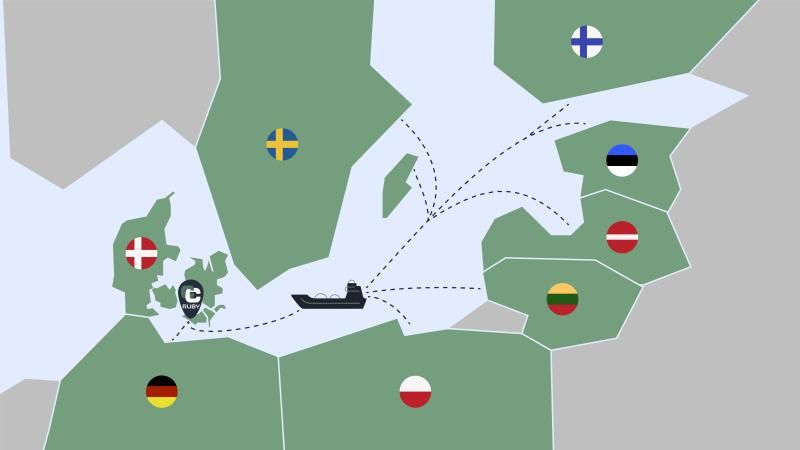The Danish Maritime Foundation supports investigation of the establishment of a mobile and floating CO2 storage facility in Rødby

11. in the future, around one million tons of CO2 can be expected to be pumped into Lolland’s underground annually. And this should preferably be done in a way that ensures the most possible CO2 reduction for the fewest resources. CarbonCuts is therefore investigating how CO2 can be imported and stored in the most appropriate way.
CarbonCuts is now receiving funding and support from the Danish Maritime Foundation to specifically investigate the possibility of using a mobile and floating intermediate storage facility to store CO2. This is a so-called batten solution; a temporary CO2 storage on a floating barge – also known as a barge. A solution that can make the temporary storage process more cost-effective and flexible. The solution is part of the initial infrastructure studies that CarbonCuts is doing to realize its concrete plans to develop Project Ruby – a land-based CO2 storage facility near Rødby on Lolland.
“We are extremely pleased with the support from the Danish Maritime Fund in our efforts to establish one of Denmark’s first land-based CO2 storage facilities. Our goal is to make CO2 management as sustainable, cost-effective and flexible as possible. Here, a batten solution can be a game changer,” says Jesper Jesper Meyer, Business Development Manager at Carbon Cuts.
Jesper Meyer believes that it is important to investigate alternative solutions to a land-based interim storage solution, so that a solution can be established that can help shape the future of CO2 transportation, import and storage in Denmark.
He elaborates:“Specially designed CO2 ships can transport CO2 over sea to the land-based storage, but there is a need for the CO2 to be stored in an interim storage facility before it is permanently stored underground. We are investigating whether a floating storage facility can be a more cost-effective and flexible solution than the other methods.”
The Danish Maritime Foundation is pleased to support the project and sees it as a good example of why it is important to include the maritime sector in green solutions. The foundation is looking forward to following CarbonCuts’ CO2 storage project, which they consider central to Denmark achieving its climate ambitions.
“The maritime industry possesses a technological ingenuity and innovative solutions that we should definitely draw on when it comes to developing future sustainable solutions. CarbonCuts is a great example of building bridges between innovative solutions on land and at sea, and the project is intended as open innovation so that Blue Denmark can benefit from CarbonCuts’ conclusions in the future,” says Lotte G. Lundberg, CEO of The Danish Maritime Foundation.
Read the full story and find out how the support and collaboration can help accelerate Denmark’s green transition.


